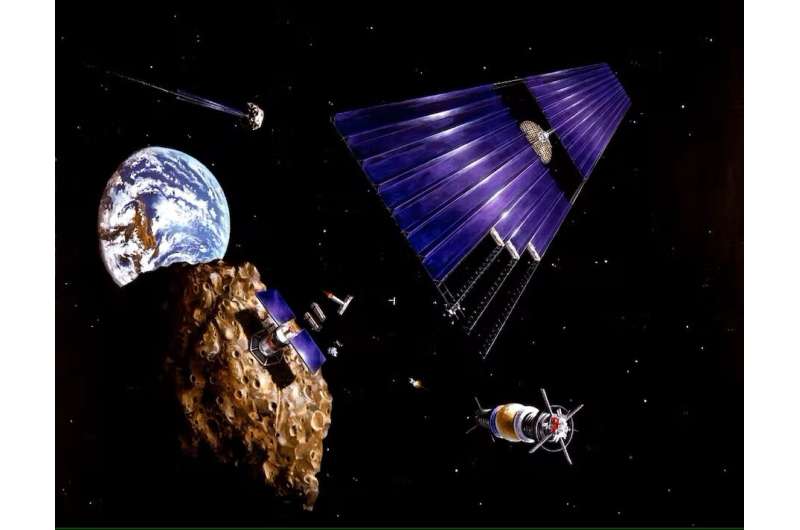Is mining in space socially acceptable?

Traditional mining has been subject to a negative stigma for some time. People, especially in developed countries, have a relatively negative view of this necessary economic activity. Primarily that is due to its environmental impacts—greenhouse gas emissions and habitat destruction are some of the effects that give the industry its negative image.
Mining in space is an entirely different proposition—any greenhouse gases emitted on the moon or asteroids are inconsequential, and there is no habitat to speak of on these barren rocks. So what is the general public's opinion on mining in space? A paper published in Sustainability by a group of researchers in Australia, one of the countries most impacted by the effects of terrestrial mining, now gives us an answer.
Strangely, as the paper points out, no one had previously studied this particular aspect of space resources. Despite the general media interest in ventures such as Planetary Resources and the success of missions such as Hayabusa-2, no one had attempted to understand how the general public felt about space mining.
It was not a foregone conclusion, as there are some potentially negative environmental factors to mining in space. While it might not cause any immediate harm to ecosystems as it does here on Earth, it does destroy "pristine" environments that have arguably been around since the dawn of the solar system, at least in the case of the asteroids. As excellently portrayed in the Mars trilogy by Kim Stanley Robinson, there will always be a part of humanity that will want to leave space as it is.
Another confounding factor is that the resources mined in space could, ostensibly at least, be used for products back on Earth. They could therefore end up in landfills, causing a longer-term environmental problem than if we simply recycled the material we already have in these large deposits of everything that humanity has created. So there was still an outstanding question of whether these potential downsides outweighed the risk in the eyes of the public.
Simply put, the public in a variety of countries broadly supports space mining, especially on asteroids. To get these results, the researchers performed two different studies, one involving almost 5,000 people in 27 (mostly rich) countries and another involving around 600 people in the US.
In the first study, the researchers asked a series of questions that focused on the participant's attitudes towards mining—specifically four different kinds: in the Antarctic, on the ocean floor, on the moon, or on asteroids. In particular, the researchers were interested in the positive and negative reactions that mining in each area elicited in their subjects.
The results were unambiguous—people generally had negative feelings toward mining on the ocean floor, especially in the Antarctic, and they generally had positive feelings towards mining on the moon, especially on asteroids. People across all 27 countries had reasonably similar responses, no matter what their income level or the environment they inhabited.
However, results from the first study were relatively shallow and did not delve too deeply into factors such as the participant's political affiliation or individual morals. These are known to profoundly impact an individual's stance toward terrestrial mining and its potential environmental impacts. Still, it was unclear what, if any, effect it would have on a person's views of space mining.
Similar in structure to the first study, the second looked at people's responses to questions about how they felt about mining in several different locations—this time including "tundra" instead of the Antarctic. However, it also delved into the individual inclinations of the person responding to the questions, including their political orientation, which is currently one of the more polarizing aspects of American life.
Neither a person's political persuasion nor their moral foundations were found to be clear indicators of whether or not that person would support mining in space. However, there was a negative correlation with support for lunar mining, specifically by those that scored higher on a test that assessed their interest in environmental sustainability. Presumably, that is because they think of the moon as a pristine "environment" and view mining activities as potentially harmful to it.
Overall these studies seem like a glowing endorsement of public support for asteroid mining. However, there are some other confounding factors, including, as the authors point out, that both lunar and asteroid mining are, at this point, highly abstract concepts, the real impact of which may be hard to grok for many study participants. But studies such as this have to start somewhere, and waiting until after there is already a fully-fledged mining mission on the moon to see if it has public support might be a little late. For now, at least, those interested in moving forward with this aspect of the economic development of space have the public on their side.
More information: Matthew J. Hornsey et al, Protecting the Planet or Destroying the Universe? Understanding Reactions to Space Mining, Sustainability (2022). DOI: 10.3390/su14074119
Provided by Universe Today





















